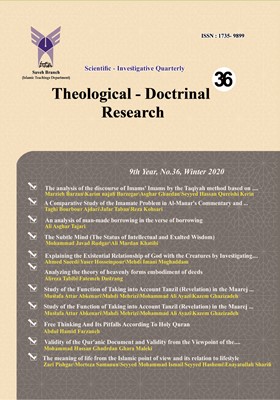-
-
List of Articles
-
Open Access Article
1 - The analysis of the discourse of Imams' Imams by the Taqiyah method based on John Searle's Theory of Speech Action
marzieh barzan Karim Najafi Barzegar azghar quedan Shsan Qurishi -
Open Access Article
2 - A Comparative Study of the Imamate Problem in Al-Manar's Commentary and Tasnim's Commentary
Taghi Bourbour Ajdari jafar taban Reza Kohsari -
Open Access Article
3 - An analysis of man-made borrowing in the verse of borrowing
Ali Asghar Tajari -
Open Access Article
4 - The Subtle Mind (The Status of Intellectual and Exalted Wisdom)
Mohammad Javad Rudgar Ali Mardan Khatibi -
Open Access Article
5 - Explaining the Existential Relationship of God with the Creatures by Investigating and Criticizing the Reasonable Reason in Sadra's Wisdom
Ahmad saeidi Yaser Hosseinpour Mehdi Imani Moghaddam -
Open Access Article
6 - Analyzing the theory of heavenly forms embodiment of deeds
gholamali sanjari -
Open Access Article
7 - Semantics of the word "caliph" in the Qur'an And its relevance to the topic of "Imamate" with emphasis on companions
alireza tabibi Fatemeh Dastrang -
Open Access Article
8 - Study of the Function of Taking into Account Tanzil (Revelation) in the Maarej Al-Tafakor va Daghyegh Al-Tadabor
مصطفی عطار آبکناری mohammad ali ayazi kazem gazizadeh -
Open Access Article
9 - Free Thinking And Its Pitfalls According To Holy Quran
AbdOlhamid Farzaneh -
Open Access Article
10 - Validity of the Qur'anic Document and Validity from the Viewpoint of the Separation School (Emphasizing on Mehdi Esfahani's views)
-
Open Access Article
11 - The meaning of life from the Islamic point of view and its relation to lifestyle
zari pishegar Morteza Samanun mohamad esmaeil said hashemi enayat sharifi
-
The rights to this website are owned by the Raimag Press Management System.
Copyright © 2017-2026







